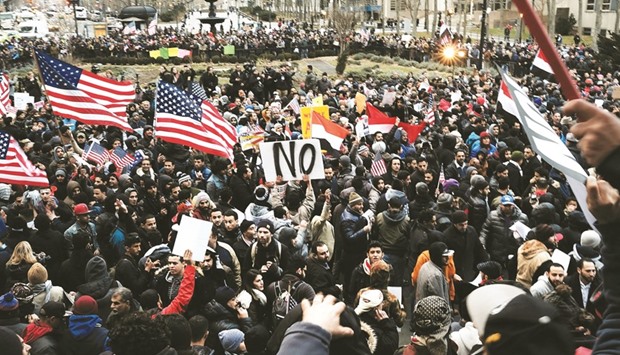A federal judge in Boston expressed scepticism yesterday about a civil rights group’s claim that President Donald Trump’s order banning citizens of seven majority-Muslim countries from entering the United States represented religious discrimination.
The hearing was one of a series of legal challenges to the measure the new Republican president signed last week, which blocked people holding passports from Iran, Iraq, Libya, Somalia, Sudan, Syria, and Yemen.
The order also temporarily stopped the entry of all refugees into the country and indefinitely halted the settlement of Syrian refugees.
Federal judges in Seattle and Virginia were also due to weigh lawsuits filed by different states and advocacy groups challenging the order.
More than 100,000 visas previously issued to citizens of the seven countries were revoked as a result of the order, a Justice Department attorney at the Virginia hearing said, according to media reports.
Attorneys at the Boston hearing also said that visas had been revoked but did not cite a specific figure.
Early on Sunday, a magistrate judge in Boston issued an injunction that for seven days blocked enforcement of the order, which the White House has contended is necessary for national security.
“Where does it say Muslim countries?” US District Judge Nathaniel Gorton asked Matthew Segal, an attorney with the American Civil Liberties Union (ACLU) representing the plaintiffs in the Boston case.
“If your honour’s question is, ‘Does the word ‘Muslim’ make a profound presence in this executive order?,’ my answer is that it doesn’t,” Segal said. “But the president described what he was going to do as a Muslim ban and then he proceeded to carry it out.”
Gorton shot back: “Am I to take the words of an executive at any point before or after election as a part of that executive order?”
Massachusetts anti-poverty group Oxfam and seven Iranian nationals have joined a lawsuit asking Gorton to extend the injunction forbidding the detention or removal of approved refugees, visa holders, and legal permanent US residents who entered from the seven countries.
The initial ban on permanent residents, or green card holders, was one of the most confusing elements in the executive order signed on January 27.
But, following an outcry and legal challenges, the Department of Homeland Security said on Sunday that green card holders would be allowed on planes to the United States and would be assessed upon arrival.
Yesterday Judge Gorton asked US Justice Department lawyer Joshua Press how the seven countries had been selected.
Press responded that the list had come from a law passed in 2015 and amended early last year requiring that citizens of the seven countries apply for visas to enter the United States, “out of concern about the refugees that were coming, mainly from Syria at that time and terrorist events that were occurring in Europe”.
The order caused chaos at US airports last weekend, with some travellers abroad turned back from flights into the United States and crowds of hundreds of people packing into arrival areas to protest the policies.
Trump has told a Christian broadcaster that Syrian Christians would be given priority in applying for refugee status in the United States.
The challenges to his order focus on religion because the Establishment Clause of the US Constitution prohibits the federal government from favouring one religion over another.
In Seattle, the states of Washington and Minnesota were together asking a judge to suspend the entire policy nationwide, which would represent the broadest ruling to date against Trump’s directive.
Should the Seattle judge rule that Washington state and Minnesota have legal standing to sue, it could help Democratic attorneys general take on Trump in court on issues beyond immigration.
During his campaign, Trump discussed the idea of temporarily banning Muslims from entering the country to protect against terrorist threats.
On Thursday, he defended the restrictions as necessary to protect religious liberty.

Ethnic Yemenis and supporters protest yesterday in the Brooklyn borough of New York City against Trump’s executive order temporarily banning immigrants and refugees from seven Muslim-majority countries, including Yemen. At least 1,000 Yemeni-owned bodegas and grocery-stores across the city shut down from noon to 8pm to protest the order.
